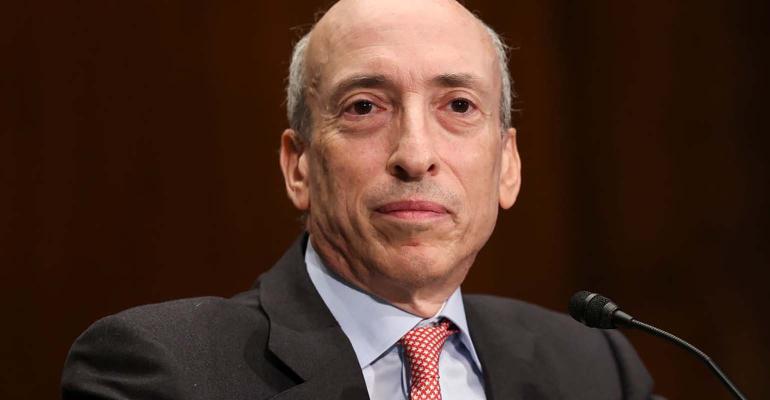(Bloomberg) -- The US Securities and Exchange Commission wants to be let in on some of Wall Street’s most confidential information — and quickly.
In a first, the SEC is going to require big hedge funds to share with regulators major investment losses in near real-time.
The rule, approved Wednesday, marks a significant shift for an industry that tends to prize its secrecy. It also promises to add to businesses’ administrative headaches. Until now, funds have generally had to report positions in quarterly public filings.
The investing public, in theory, won’t be any wiser. Only the SEC will be notified, privately, when significant losses occur. Just how that’s going to work remains to be seen. Large hedge funds will have no more than 72 hours, or “as soon as practicable,” to tell the agency about extraordinary investment losses and major margin events.
The rule is part of a campaign by SEC Chair Gary Gensler to scrutinize private investments funds, whose wagers — both winning and losing — can reverberate through financial markets. The SEC says the stepped-up reporting by hedge funds that oversee at least $1.5 billion in assets will let Wall Street’s main regulator, as well as the Treasury Department and other agencies in Washington, get a handle on swift-moving events that may pose systemic risks.
“Private funds have evolved significantly in their business practices, complexity and investment strategies,” Gensler said. “Private funds today are ever more interconnected with our broader capital market.”
The SEC proposed in January 2022 allowing just one business day for hedge funds to disclose major events. The agency has dubbed these “trigger events” and, in addition to big losses, they can include things like significant changes to prime-brokerage relationships, available cash or counterparty defaults. Losses exceeding 20% in a short period would qualify, the regulator said.
Read More: Hedge Funds Face New SEC Disclosures as Gensler Cracks Down
Industry groups are already flagging concerns that the requirement to quickly report major events will pose its own operational challenges and could result in a deadline even shorter than the 1-day period initially proposed.
“While alternative asset managers do not pose systemic risk, we are sympathetic to efforts seeking to monitor risk throughout the financial system,” Bryan Corbett, president and chief executive officer of the Managed Funds Association, a trade group representing hedge funds, said in a statement. He added that the group is concerned the new rules may “exacerbate stress on funds, harm investors, and increase market volatility without commensurate benefit.”
“Some triggering events will be difficult to pinpoint to a specific time from which the 72 hours will begin tolling and the lack of a deadline on a business day increases the likelihood of filing deadlines occurring out of regular business hours or over weekends,” Jennifer Wood, global head of asset management regulation at the Alternative Investment Management Association, said in a statement.
Others lauded the SEC’s move.
“The importance of this reform is clear,” Stephen Hall, legal director and securities specialist at Better Markets, a Washington-based group that advocates for tougher regulation, said in a statement. Private funds “are investing in more diverse types of assets, with more interconnections to the financial markets,” he said.
Expanded oversight over private fund managers has been a long-time policy goal of Democratic lawmakers, including Massachusetts Senator Elizabeth Warren. But the push to speed up the now quarterly filings, known as Form PF, really picked up in the wake of the trading turmoil after the onset of Covid-19 and when retail investors plowed money into stocks such as GameStop Corp. in early 2021.
Closely Guarded Secrets
Hedge funds and private equity firms have consistently pushed back against any efforts by the SEC to expand the type of data they must confidentially disclose, arguing that it’s proprietary information that could fall into the hands of unauthorized users through a data breach or other slip-ups. The forms contain some of the private fund industry’s most closely guarded secrets and are handled by a very small number of agency staff.
“The SEC has handled confidential market information since its founding,” Gensler told reporters after the commission’s vote, adding that the SEC’s leadership is focused on cybersecurity.
Under the changes, private equity firms will also have to make faster disclosures for some trigger events, including the removal of a general partner and certain fund terminations. The final rule also requires large firms with at least $2 billion in assets under management to provide more data about their strategies, use of leverage, and a general partner’s performance compensation.
The agency’s three Democrats approved the plan, while its two Republican members voted in opposition.
Separately, the SEC approved changes to increase the data that public companies must disclose about their stock buyback programs. Investors will start getting quarterly or semiannually aggregated information on daily repurchase activity.
The SEC contends the changes will help investors figure out for themselves whether a company’s repurchases are being used to actually increase shareholder value or to benefit executives.
--With assistance from David Gillen.





